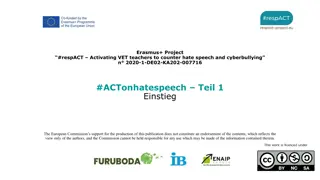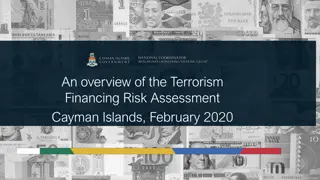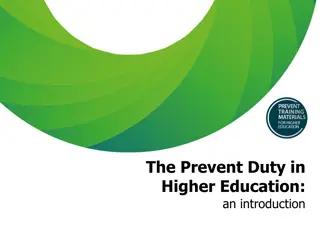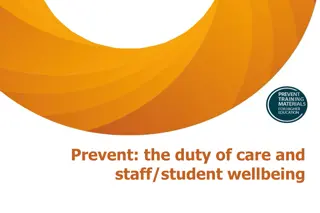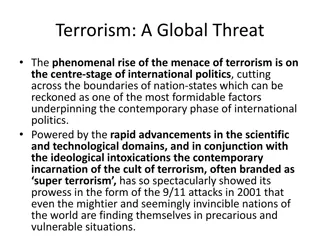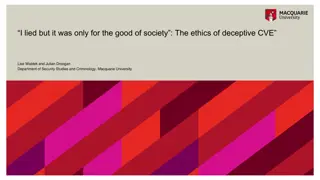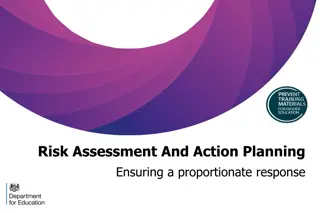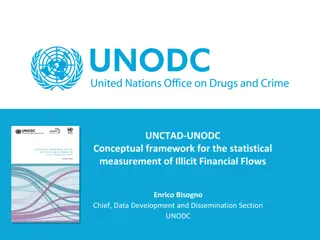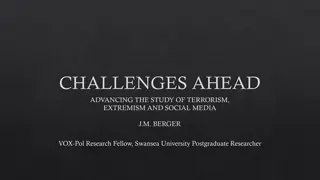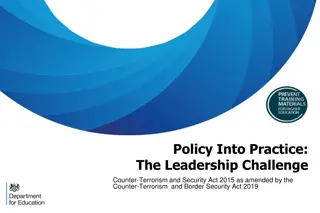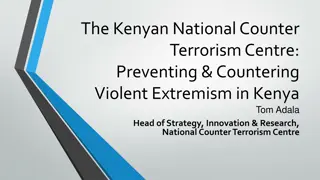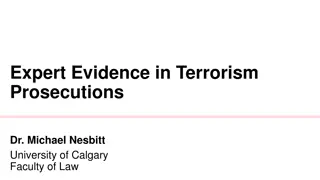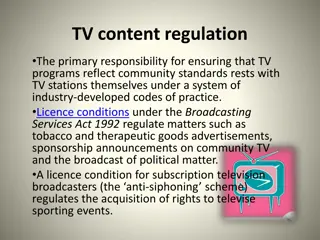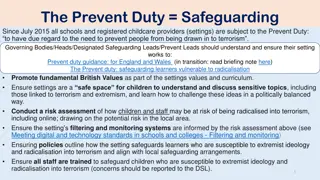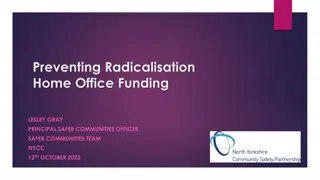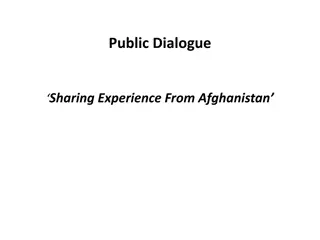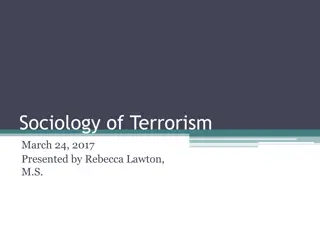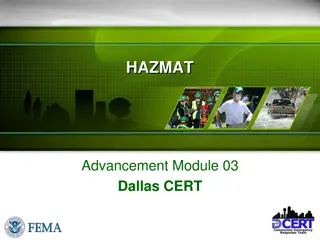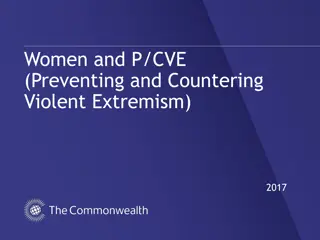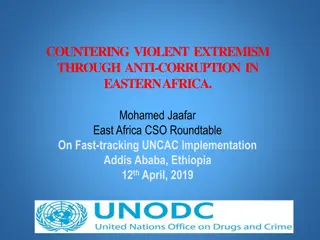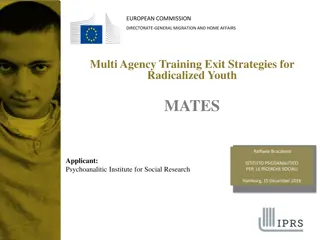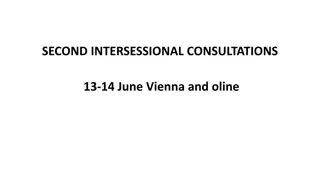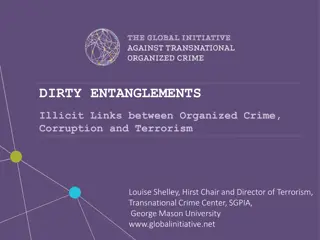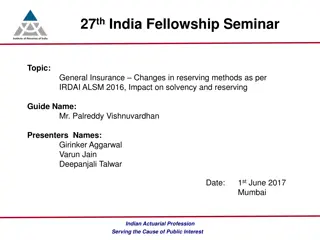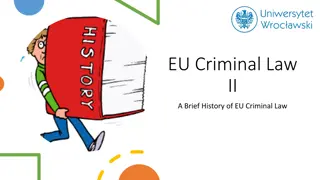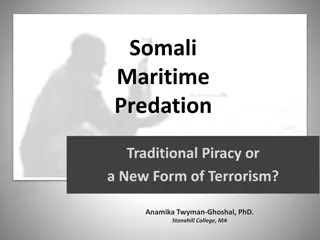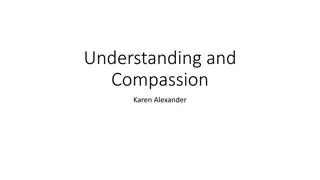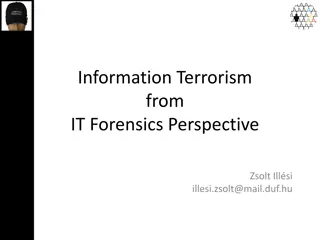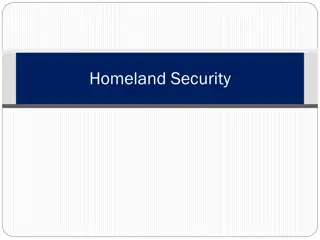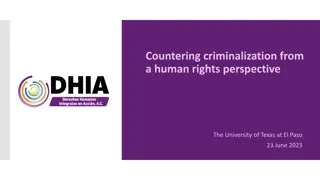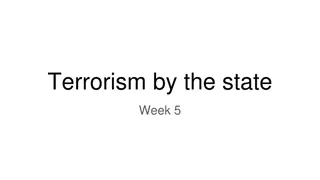Understanding Anti-Money Laundering (AML) and Combating Financing of Terrorism (CFT) Framework
Learn about the essential components of Anti-Money Laundering (AML) and Combating the Financing of Terrorism (CFT) framework, including regulatory obligations, objectives, money laundering processes, stages, sanctions, and regulatory overview. Discover how money laundering, terrorist financing, and
1 views • 30 slides
COVID-19 Communications: Promoting Prevention Measures & Vaccine Confidence
Promoting prevention measures and vaccine confidence during the COVID-19 pandemic requires clear and consistent communication, addressing concerns, countering misinformation, and collaborating across sectors. Key principles of respect, empathy, transparency, and equity guide effective communication
0 views • 9 slides
Understanding and Countering Hate Speech in VET Education Workshops
Explore the pivotal workshop content on addressing hate speech in vocational education and training (VET). Delve into the definition of hate speech, its impact, examples, and ways to react effectively. Engage in discussions on personal encounters with hate speech and its prevalence across various to
1 views • 59 slides
Terrorism Financing Risk Assessment in Cayman Islands (February 2020)
The Terrorism Financing Risk Assessment in Cayman Islands, conducted in February 2020, analyzed data on cross-border fund flows, trade statistics, intelligence on terrorism financing, and more. The assessment identified high-risk jurisdictions and utilized the FATF's guidance to assess risks related
2 views • 16 slides
Understanding the Prevent Duty in Higher Education
This introduction module provides essential information on the Prevent Duty in higher education, outlining its statutory requirements and objectives. It covers topics such as the Counter-Terrorism and Security Act 2015, the process of radicalization, and strategies to prevent individuals from being
0 views • 37 slides
Understanding Prevent Duty in Higher Education: Care, Wellbeing & Support
The Prevent duty in higher education requires specified authorities to prevent individuals from being drawn into terrorism. Alongside duty of care, institutions must safeguard staff and student wellbeing while identifying and supporting at-risk students. Effective pastoral care and policies for pray
2 views • 25 slides
Terrorism: A Global Threat in International Politics
The rise of terrorism as a global menace is a significant factor in contemporary international politics. Fueled by advancements in technology and ideology, terrorism poses a formidable challenge, exemplified by events like the 9/11 attacks. Efforts are needed to combat terrorism on both national and
0 views • 24 slides
Deceptive CVE Strategies and Ethical Considerations in Countering Violent Extremism
Exploring the complexities of implementing online CVE programs to divert youth from violent extremist narratives, this article discusses the use of counter-narratives, ethical challenges of deception, and the importance of reflexivity in program design and implementation.
0 views • 13 slides
Effective Rebuttal Strategies in Debate
Rebuttal strategies like "delink," "terminal defense," and "topicality delinks" are discussed with examples on how to effectively counter opponents' arguments in debate settings. These tactics aim to point out flaws, falsehoods, or lack of relevance in the opponent's claims without directly disprovi
0 views • 10 slides
Effective Strategies for Preventing Terrorism: Risk Assessment and Action Planning
Counter-Terrorism and Security Act 2015 mandates Higher Education providers to conduct risk assessments to prevent students from being drawn into terrorism. Understanding the law and compliance requirements is crucial, followed by developing a thorough action plan driven by risk analysis. The plan s
0 views • 21 slides
Understanding Illicit Financial Flows and Their Implications
This content delves into the conceptual framework for measuring Illicit Financial Flows (IFFs), highlighting how IFFs intersect with various policy agendas such as tax evasion, corruption, and terrorism financing. It also emphasizes the importance of addressing IFFs for sustainable development, peac
1 views • 10 slides
Army Leadership Doctrine Update: ADP 6-22.1 Highlights
New Army Doctrine Publication (ADP) 6-22.1, "Army Leadership and the Profession," emphasizes the foundational principles of leadership with updated content and guidance. It covers essential leadership traits, values, competencies, and behaviors, providing insights into effective leadership practices
1 views • 6 slides
Advancing Research on Terrorism, Extremism, and Social Media Challenges
Delve into the complexities of terrorism and extremism studies, uncovering the nuances between violent extremism and terrorism, challenging existing definitions, and exploring the evolving fields in the realm of social media. The discourse navigates the shifting focus, the definitions of terrorism a
0 views • 9 slides
Leadership Responsibilities in Counter-Terrorism Policies
Leadership roles under the Counter-Terrorism and Security Act involve establishing mechanisms to understand radicalization risks, ensuring staff capabilities to address these risks, promoting duty importance, and maintaining effective policy implementation. Governing bodies must provide annual assur
0 views • 16 slides
Preventing & Countering Violent Extremism in Kenya: The NCTC Efforts
The Kenyan National Counter Terrorism Centre (NCTC) is actively involved in preventing and countering violent extremism, particularly focusing on groups like Al Shabaab and ISIS in Kenya and the region. The NCTC collaborates with organizations like ICSVE to create counter-narrative videos for preven
3 views • 10 slides
Analysis of Expert Evidence in Terrorism Prosecutions
The data presented highlights statistics on resolved terrorism prosecutions, including conviction rates, gender proportions, involvement of experts, categories of expert evidence, and the treatment of experts by judges. The analysis includes details on the types of expert evidence used, appearances
4 views • 10 slides
Television Content Regulation in Australia
Television content regulation in Australia is overseen by industry-developed codes of practice and specific licence conditions under the Broadcasting Services Act 1992. TV stations hold the primary responsibility to ensure that programs reflect community standards. Regulations cover areas such as to
0 views • 12 slides
PREVENT Strategy Implementation in Sheffield Schools: Autumn/Winter 2015-16
Raising awareness of the PREVENT strategy in Sheffield schools during the Autumn/Winter term of 2015-16 is crucial for safeguarding and preventing individuals from supporting terrorism. The strategy emphasizes the duty of schools to address all forms of terrorism through various initiatives like wor
0 views • 16 slides
Understanding the Prevent Duty in Safeguarding Training at St. Philip Westbrook CEAP
In the Prevent Strategy training session at St. Philip Westbrook CEAP in December 2015, participants were educated on the Prevent duty outlined in the Counter-Terrorism and Security Act 2015. The session aimed to clarify the responsibilities of schools and childcare providers in preventing individua
0 views • 25 slides
Safeguarding Against Terrorism: The Prevent Duty in Education Settings
Since July 2015, schools and childcare providers must comply with the Prevent Duty to prevent individuals from being radicalized into terrorism. This duty involves promoting British values, conducting risk assessments, training staff, and making referrals when necessary. Prevent training is essentia
0 views • 7 slides
Understanding Prevent Duty Guidance in the UK Education Sector
Statutory guidance under the Counter Terrorism and Security Act 2015 outlines the Prevent Duty, requiring authorities to prevent individuals from being drawn into terrorism. The guidance specifies responsibilities for various sectors, including local authorities, police, education, health, and crimi
0 views • 50 slides
Enhancing Counter Terrorism Efforts Through Community Partnerships
The Prevent CSO Strategy focuses on aligning partnerships with Counter Terrorism objectives to address radicalization causes and provide early interventions. A new Funding Model administered by Groundwork aims to empower Local Authorities to bid for Prevent projects. The Counter Terrorism Local Prof
0 views • 8 slides
Understanding Afghanistan: Insights on Religion, Insurgency, Terrorism & the New World Order
Delve into the complexities of Afghanistan's history, recent acts of violent extremism, and the importance of holistic approaches in countering extremism. Explore the landlocked country's demographics, conflicts, and significant events shaping its narrative.
0 views • 30 slides
Sociology of Terrorism: Understanding the Dynamics and Impacts
Delve into the intricate world of terrorism with a focus on analysis, identification, and stages leading to radical actions. Explore the social, political, and historical context behind terrorism, emphasizing the importance of understanding individual perpetrators. Uncover the complexities of justif
0 views • 38 slides
HAZMAT and Terrorism Response Protocols
This module covers HAZMAT awareness, safety protocols, and CERT tasks in dealing with hazardous materials incidents. It also provides guidance on recognizing and responding to potential terrorism incidents. Key topics include using the Emergency Response Guidebook, CERT team responsibilities, victim
0 views • 57 slides
The Role of Women in Preventing and Countering Violent Extremism
Women play crucial roles in preventing and countering violent extremism (P/CVE) by being powerful change agents, detecting early signs of radicalization, and providing counter narratives. Their involvement is important for developing targeted efforts to counter extremism and prevent terrorism. UN Se
0 views • 8 slides
Countering Violent Extremism Through Anti-Corruption in Eastern Africa
The project aims to pilot the impact of countering police corruption on radicalization and acts of violent extremism in Eastern Africa. By increasing internal anti-corruption oversight, empowering communities to report corruption effectively, and promoting collaboration between community, police, an
0 views • 17 slides
Multi-Agency Training for Radicalized Youth: Defeating Terrorism through Desensitization
This project, led by the European Commission, aims to combat radicalization and terrorism by implementing multi-agency training programs focused on social reintegration, prevention of recruitment, and increasing motivation among young individuals. Partnering with several universities and organizatio
0 views • 20 slides
Role of Civil Society and Indigenous Peoples in Countering Cybercrime
Civil society and indigenous peoples play a crucial role in the implementation of the International Convention on Countering the Use of Information and Communications Technologies for Criminal Purposes at national levels. Cybercrime encompasses various activities, ranging from fraud and identity the
0 views • 15 slides
Understanding Extremist Risks: Insights and Strategies
Explore the complexities of extremist risk through a lens of psychological and contextual analysis. Delve into the nature of terrorism, different types of terrorism, and the importance of robust risk assessment in preventing, pursuing, protecting, and preparing against terrorist activities.
0 views • 21 slides
The Interplay of Organized Crime, Corruption, and Terrorism
Complex interconnections exist between organized crime, corruption, and terrorism, with almost all terrorist groups funded by criminal activities. These illicit ties create challenges for regional and global stability, undermining development opportunities. The United Nations has recognized the link
0 views • 12 slides
Challenges in Pricing Cyber Risk and Terrorism Risk: Impact on Solvency and Reserving Methods
The seminar discusses the challenges in pricing cyber risk and terrorism risk, with a focus on changes in reserving methods as per IRDAI ALSM 2016 and their impact on solvency and reserving. Key areas of consideration under ALSM 2016, valuation of assets, estimation of liabilities, and more are cove
0 views • 21 slides
Evolution of EU Criminal Law Through Cooperation and Commitment
The history of EU criminal law traces back to the Treaty of Rome in 1957 when the EU initially focused on economic matters. Over the years, with the judgment in the Stauder case in 1969 and the formation of the TREVI group in the 1970s, cooperation on security and combating terrorism laid the founda
0 views • 59 slides
Understanding Somali Maritime Predation: Piracy or Terrorism?
Delve into the complexities of Somali maritime predation, questioning whether it falls under traditional piracy or is evolving into a new form of terrorism. Explore the distinct characteristics, international legal definitions, and policy implications surrounding this critical issue.
0 views • 19 slides
Understanding Social Progress and Terrorism: Factors and Solutions
Exploring the socio-economic factors contributing to terrorism and hindering social progress, this content delves into the correlation between unemployment, state repression, violence, and terrorism. Key factors analyzed include weak state capacity, corruption, extremist ideologies, and social injus
0 views • 15 slides
Evolution of Indo-US Relations in the 21st Century
Indo-US relations have evolved significantly post the bilateral nuclear agreement in 2005. The relationship has moved beyond cold war dynamics to encompass cooperation in various spheres such as security, clean energy, democracy promotion, health, cyber security, and terrorism. There is a growing co
0 views • 28 slides
Insights into Information Terrorism from IT Forensics Perspective
Delve into the world of terrorism and information technology through the lens of IT forensics. Explore topics such as the uncertainties surrounding cybersecurity and digital crimes, the role of security players, Locard's Exchange Principle, computer investigations, evidence analysis, investigator qu
0 views • 15 slides
Understanding Homeland Security in the United States
Homeland security in the United States encompasses measures aimed at preventing terrorist attacks, reducing vulnerability to terrorism, and aiding in recovery from attacks. Key aspects include the Homeland Security Act of 2002 which established the Department of Homeland Security and the focus on ho
0 views • 13 slides
Perspectives on Countering Criminalization Through Human Rights
Discover the University of Texas at El Paso's initiatives in countering criminalization from a human rights standpoint. Explore recommendations from the National Commission of Human Rights and insights on juvenile referral programs. Unveil misconceptions, challenges in trafficking prevention, and un
0 views • 9 slides
Understanding State Terrorism and Its Implications on Society
State terrorism, employed by governments or factions within them, poses a grave threat to citizens and international peace. This form of terrorism includes intimidation, coerced conversion, and genocide as tools to maintain control. Dictators find it easier to carry out state terrorism in secret, of
0 views • 7 slides


